Thai Massage, with its origins in ancient Thailand, has gained worldwide popularity for its unique techniques and therapeutic benefits.
This holistic practice, rooted in the concept of energy balance, is known for its personalized approach and reliance on recipient-based customization.
In this comprehensive article, we will delve deep into the world of Thai Massage and will explore when Thai massage can do damage and may not be suitable.
It’s essential to understand the potential damages to make informed decisions about your well-being.
Can Thai Massage Do Damage?
While Thai Massage offers numerous benefits when administered correctly, it is not without potential risks.
Improper execution of Thai Massage techniques, such as applying excessive pressure, aggressive stretching, or neglecting to adapt the therapy to an individual’s specific needs and physical condition, can result in discomfort, muscle soreness, strains, and even injury.
In some cases, recipients may experience lingering pain, redness, malaise, headaches, or an overall sense of feeling drained after a session.
5 Risks Involved In Thai Massage
While Thai Massage offers numerous benefits, it’s crucial to acknowledge that, like any form of therapy, it is not entirely risk-free.
Understanding these potential risks can help individuals make informed decisions about whether Thai Massage is suitable for them.
1. Excessive Pressure & Intensity
One common risk associated with Thai Massage is the application of excessive pressure or intensity. While some individuals may benefit from deep pressure, others may find it uncomfortable or even harmful.
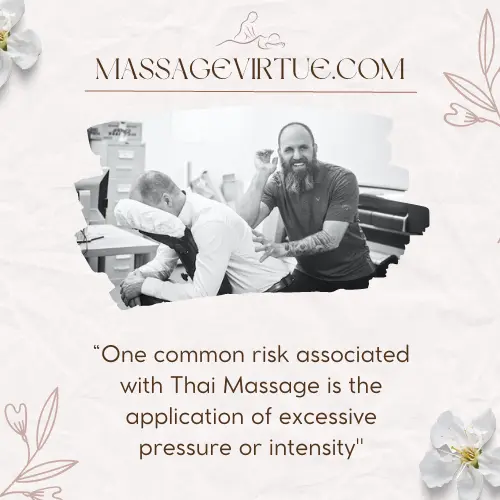
Overly vigorous stretching or forceful manipulation of muscles and joints can lead to long-term issues, including muscle soreness, strains, and potential injury.
2. Deep Tissue Issues
Thai Massage often incorporates deep tissue techniques to target specific areas of tension or pain.
However, the depth and intensity of these techniques must be carefully adjusted to each recipient’s tolerance and physical condition. If not performed correctly, deep tissue work can cause discomfort, bruising, or injury.
3. Long Periods of Pain
Improper execution of Thai Massage may result in lingering pain and discomfort following the session. While some level of post-massage soreness is normal, excessive or prolonged pain should not be ignored.
It’s essential to communicate openly with your therapist during the session to ensure that the pressure and techniques are within your comfort zone.
4. Soreness, Redness, Malaise, Headaches & an Overall Sense of Feeling Drained
While these side effects are relatively uncommon, some recipients may experience soreness, redness, malaise, headaches, or a sense of feeling drained after a Thai Massage session.
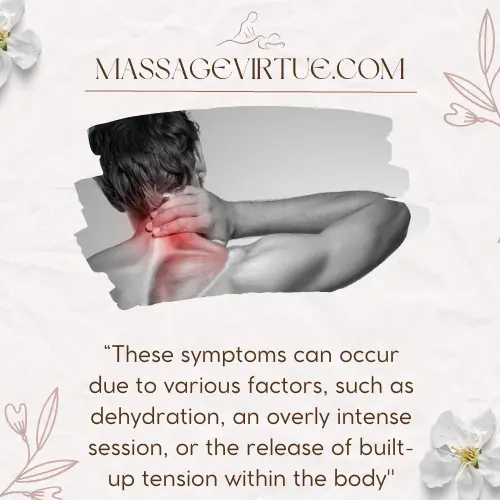
These symptoms can occur due to various factors, such as dehydration, an overly intense session, or the release of built-up tension within the body.
It’s crucial to stay hydrated before and after the massage and communicate any discomfort with your therapist to make necessary adjustments.
5. Health Conditions to Consider
Thai Massage may not be suitable for individuals with certain underlying health conditions.
It’s essential to consult with a healthcare provider before scheduling a session if you have any of the following conditions:
High Blood Pressure:
Individuals with high blood pressure should approach Thai Massage with caution. The manipulation of the body and the application of pressure can influence blood pressure levels. Consultation with a healthcare provider is advised.
Diabetes:
Diabetic individuals should be mindful of their condition during a Thai Massage. The therapy can affect blood sugar levels, so it’s crucial to monitor and communicate any sensations of lightheadedness or changes in energy levels.
Heart Disease
Individuals with heart disease, including coronary artery disease, should seek medical advice before undergoing Thai Massage.
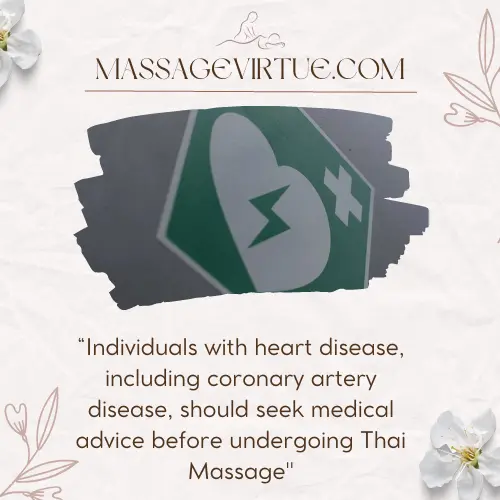
The physical exertion involved in some techniques may place additional strain on the cardiovascular system.
Osteoporosis
Thai Massage includes stretching and pressure on the bones and joints. People with osteoporosis should exercise caution, as their bones may be more fragile and prone to fractures.
Neurological Diseases
Those with neurological diseases, such as multiple sclerosis or Parkinson’s disease, should inform their therapist about their condition.
The therapist can then adapt the session to accommodate any mobility challenges or sensitivities.
Strains and Sprains
If you have existing muscle strains or sprains, be sure to communicate this to your therapist. They can modify the massage techniques to avoid aggravating these injuries.
When To Avoid Thai Massage?
In some cases, it may be advisable to avoid Thai Massage altogether or to consult with a healthcare provider before scheduling a session.
Here are situations in which caution should be exercised:
1. While Having Recreational Drugs
It is strongly recommended to avoid Thai Massage if you have recently consumed recreational drugs or alcohol.
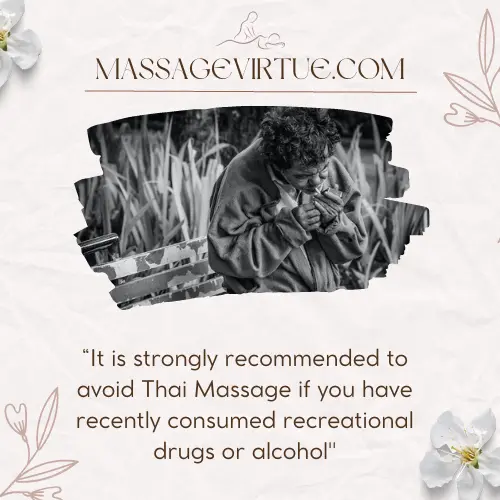
These substances can impair your ability to fully engage with the therapist and may lead to unpredictable reactions.
2. Skin Infection
If you have an active skin infection, it’s best to postpone your Thai Massage session to prevent the spread of infection. The close physical contact during the massage could exacerbate the issue.
3. While Having Fever
Refrain from Thai Massage if you have a fever. A fever is a sign that your body is fighting off an infection, and participating in a massage session can worsen your condition and potentially spread illness to the therapist.
4. When Going Through Inflammation
Individuals experiencing acute inflammation, whether due to an injury or an underlying medical condition, should exercise caution with Thai Massage. The therapy may exacerbate inflammation and discomfort.
5. Had Undergone Surgery
If you’ve recently had surgery, especially major surgery, consult with your surgeon or physician before engaging in Thai Massage.

It’s essential to ensure that massage won’t interfere with the healing process or disrupt surgical incisions.
6. Having Bone Problems
Individuals with severe bone problems, such as fractures or advanced osteoporosis, should approach Thai Massage with caution.
While the therapy can be adapted to accommodate such conditions, it’s essential to communicate your condition with the therapist and seek medical guidance if necessary.
4 Things You Must Know About Thai Massage
1. No Use Of Oil
One of the distinctive features of Thai Massage is the absence of oils or lotions during the session.
Unlike traditional Western massages that often rely on these substances, Thai Massage employs a combination of acupressure, stretching, and assisted yoga postures to stimulate energy flow within the body.
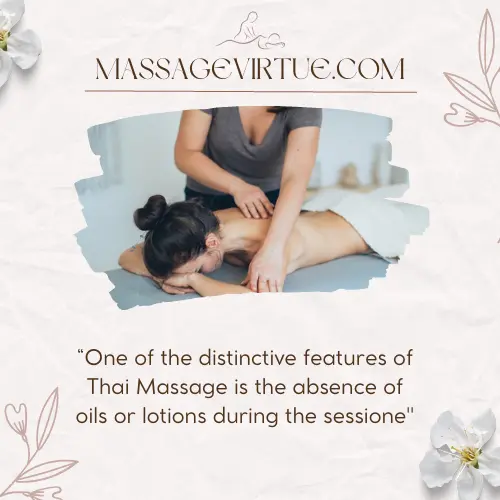
The absence of oils enhances the grip of the therapist’s hands and allows for a more direct and controlled application of pressure.
2. Intimating & Based on Personalized Experience
Thai Massage is more than just physical therapy; it is a deeply intimate and personalized experience. Practitioners take into account the recipient’s specific needs, preferences, and concerns.
This approach makes Thai Massage highly adaptable, as it can be tailored to address various physical and mental conditions.
Whether you’re seeking relaxation, relief from chronic pain, or improved flexibility, a skilled Thai Massage therapist can customize the session to meet your objectives.
3. Recipient-Based Customization
Every Thai Massage session is a collaborative journey between the practitioner and the recipient.
The therapist assesses the recipient’s physical condition, energy levels, and any areas of tension or discomfort before tailoring the treatment accordingly.
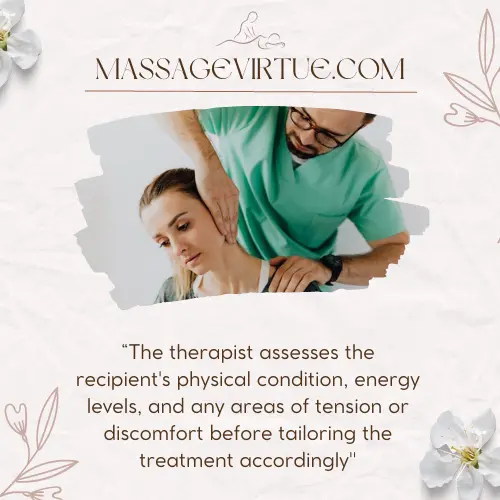
This personalized approach ensures that the massage is both effective and comfortable, as the therapist can adjust techniques, pressure, and stretches to suit the recipient’s unique requirements.
4. Done with Clothes
Unlike many massage therapies where clients undress and are draped in sheets or towels, Thai Massage is performed with the recipient fully clothed.
This aspect of Thai Massage sets it apart from other massage modalities. Clients wear loose, comfortable clothing that allows for a wide range of motion.
This clothing choice not only preserves modesty but also facilitates the various stretches and movements involved in the massage.
It creates a sense of comfort and ease, eliminating the need for disrobing and ensuring a relaxed atmosphere throughout the session.
Brief History Of Thai Massage
To truly understand Thai Massage, it’s essential to explore its rich history. This ancient healing art can be traced back over 2,500 years to India.
It was brought to Thailand by Buddhist monks who integrated elements of Ayurvedic medicine and yoga into their practice.
Over centuries, Thai Massage evolved into the unique therapeutic system we know today.
The traditional Thai name for Thai Massage is “Nuad Boran,” which translates to “ancient massage.” This name reflects its historical significance and enduring presence in Thai culture.
Conclusion
Always communicate openly with your therapist and consult with healthcare professionals when in doubt.
In your journey to harness the power of Thai Massage for your well-being, knowledge is your greatest ally. Balance the potential for relaxation and healing with an awareness of potential risks to enjoy the full benefits of this ancient practice.
Remember, your health and comfort are paramount, and informed choices will lead you to a more fulfilling and enriching experience with Thai Massage.

